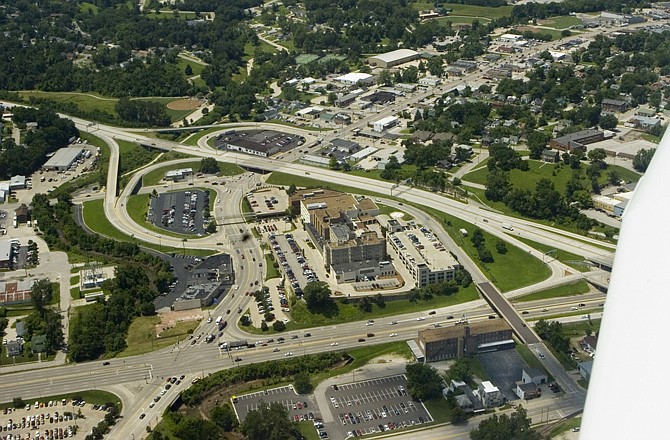A proposal to redevelop the old St. Mary's Health Center site using tax increment financing was introduced to the Jefferson City Council on Monday night.
Farmer Holding Company proposed two projects in February to redevelop the historic St. Mary's site into a place for restaurants, retail shops, office space and possibly an extension of Lincoln University. FHC proposed using TIF funding to make the project more feasible.
Tax increment financing allows developers to finance projects in blighted areas by using a percentage of local sales and property tax revenue produced in the community that results from the development. If approved, FHC will be reimbursed for a portion of the construction costs over 23 years.
The first option proposes a $44.6 million project to turn a portion of the old hospital, built in 1905, into a satellite campus for LU and other parts of the facility into commercial space. This is the preferred project, FHC attorney Korb Maxwell said.
The second option proposes a $30.9 million project for commercial space.
The company sought $7.3 million in TIF assistance for the Lincoln project and $6.7 million for the commercial project.
In the Lincoln project, the old hospital building and most of its additions would be renovated. A majority of the additions would be used for the LU nursing program, and provide more than 100,000 square feet of space. Four commercial pads with 21,000 square feet of space would be constructed.
In the commercial project, the St. Mary's Hospital building would be renovated for office space. Its additions, however, would be demolished for retail and parking space. Six commercial pads with 30,200 square feet of space would be constructed.
A parking garage closest to the old hospital would be demolished in both plans, but the other two parking garages would remain.
Maxwell said the reason FHC is presenting two projects is because they cannot guarantee LU will partner on the Lincoln project.
"We don't control 100 percent of our destiny, but we are asking you for the next step to move forward," he said to City Council. "We believe the time is now."
Maxwell said if the council approves the project, FHC will discuss the next step with LU and decide which project FHC will move forward with.
City Council will vote on the two projects Aug. 21.
If approved by the council, construction would start in 2018; the company anticipates the project would be finished in 2020.
Part of the project is creating the St. Mary's Hospital Community Improvement District - a special taxing district that can impose sales tax, special assessments and property tax to help pay for improvements in the district. The bill states the district's primary purpose is implementing a 1 percent sales tax to help fund project costs on the old hospital site.
Fifty percent of the revenue from the CID would go towards the TIF reimbursable project costs. The other 50 percent would go to the CID to pay for other eligible project costs, Maxwell said.
FHC's parent company, F&F Development, purchased the site in December 2015 after SSM Health relocated the hospital to its Mission Drive location in 2014.
In June, the Jefferson City TIF Commission voted unanimously to recommend approval of the plan to the City Council.
In May, two reports from city staff recommended the project's approval. The reports stated the project met the TIF funding conditions, and the rate of return on investment would be too small to spur private redevelopment of the old hospital site without taxpayer assistance.
The rate of return on investment for both projects without TIF funding would be minus 6.32 percent, FHC said in its proposal. With TIF funding, the return on investment would be 8.65 percent on the Lincoln project and 8.79 percent on the comercial project, FHC said.
FHC proposed taxpayers pay mainly through two sales taxes. These two sales taxes will generate a combined $6.65 million for the Lincoln project or $6.02 million for the commercial project.
The company also proposed using 0.75 percent of the 1 percent of the city's economic activity taxes. While not originally captured by the TIF, this would add $700,651 to the Lincoln project or $671,735 to the commercial project.
Currently, FHC pays $23,051 per year in property taxes, which they would continue to do while the TIF is in place, Farmer Holding Company Principal Rob Kingsbury said. After the TIF expires, FHC's property taxes would increase to $743,202 per year for the Lincoln project and $1.3 million per year for the commercial-only project.
City Mayor Carrie Tergin said she was excited there are ideas for redeveloping the St. Mary's site off U.S. 50 between Missouri Boulevard and Boliver Street.
"It's good to see something happening," she said. "The longer it sits empty, the more likely it will sit and become dilapidated."

